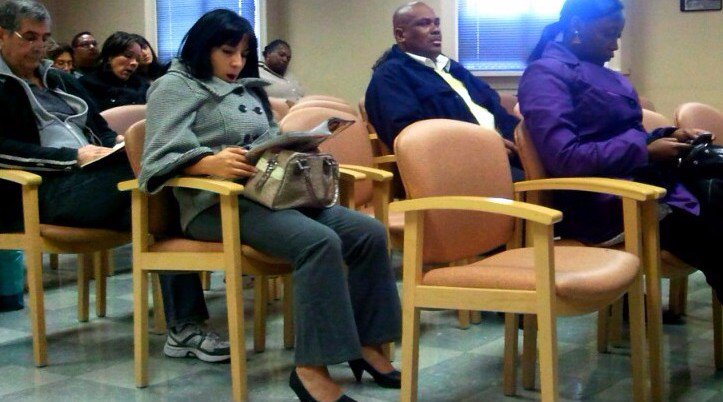- I have to.
- I get to.
It’s a word of difference, but when using one rather than the other in my internal monologue, it’s often a world of difference.
I generally love school, except those times when I “have” to write a paper. 1 There are, however, moments on my better days when I have changed my mental frame. Rather than “having” to write a paper, I try to think about how in this process I “get” to receive an education.
I still must write the paper, but it’s a different experience. Rather than being pulled like an uncooperative donkey, “getting” to receive an education makes me feel grateful. Writing papers can even be enjoyable.
***
The form arrived in the mail, and I was not thinking about “getting” to do anything. I was frustrated that I was summoned for jury duty and immediately wondered how I might get out of this.
I knew that jury duty was a possibility, just like car accidents are a possibility, but it was nice to think that my good fortune would continue
After living in many states and never being summoned, I was called for duty during the first month I was eligible in Massachusetts.2 There were no loopholes. If you can appear there physically — and, in all honesty, I could — then you are expected to be there.
I was greeted at the courthouse by an officer who was weeks away from having his job replaced by newly-arrived machines in the back of the room. He shepherded the frustrated potential jurors and played a cheesy video about the glories of this civic duty — or, rather, “civic opportunity,” as the video told us.
It was patriotic propaganda. But in hearing background music that pulled at my heartstrings and in looking around at such a diverse collection of people that I would not normally interact with, it worked. I started to think that maybe this wasn’t such a bad break from the papers I had/got to write.
But only for one day, I thought. Let me check the box of my civic opportunity and then let me continue with my life.
The Commonwealth of Massachusetts had other plans.
***
I wasn’t chosen for the first or second trial of the day, but that just meant I was thrown back in the pool for the next case, a criminal trial. The judge looked at my paper that said I was a Jesuit seminarian and then looked at the prosecuting attorney, seeming to say, “Are you sure you’re ok with him?”
I guess she was. Welcome to jury duty.
It was no bed of roses. I sat through multiple days of questioning. I learned more about firearms than I ever wanted to. I wondered whether the interaction between the police and the defendant that led to the case would have happened if the racial dynamics were different. And then our jury ultimately found the defendant guilty, knowing that a 19-year-old kid would go to prison and have a criminal record for the rest of his life.
After serving on the trial, some of the Americans from my community told me, “That’s too bad. You should have worn the Roman collar. It helps your chances of getting out of it.”
Jesuits from other countries, however, had very different reactions. They had seen a bunch of American movies with courtroom scenes and thought it was cool that I was on a jury. They also come from countries where they don’t have jury trials. They don’t “have” to do jury duty because those accused of crimes don’t “get” to have their cases heard in this manner.3
Moreover, even though many try to avoid jury duty like the plague, I was deeply impressed by the whole experience. The judge was wise and fair. The state’s attorney was well prepared. I felt a silent solidarity with the other jurors during the trial and was touched by their thoughtfulness when we discussed the case. 4
***
I initially looked at jury duty as something that I had to do. And I did not always like the experience. But I’m grateful that I got to serve my community in this way.
Perhaps not everything lends itself to this glass-half-full way of thinking, but the “get to” mindset can work more often than we might think. It’s sad to attend funerals, for example, but we get to think about what this person has meant to us, show our support for the grieving, and actually confront death, rather than running away from it.
And, when a family member or housemate leaves an empty roll of toilet paper on the dispenser, rather than becoming frustrated about having to change it — my immediate reaction 99% of the time — I would be a much happier person if I saw it as an opportunity to do a simple service for others.
Admittedly, I don’t know how often I will actually practice this “get to” mindset. Just yesterday, I was frustrated that I had to sit through traffic, rather than realizing that I get to live in a dynamic place where people want to be.
But hey, I didn’t have to write this (and you didn’t have to read it). I got to. And that’s a start.
– // –
The cover photo by Flickr user Mordy Steinfeld can be found here.
- Admittedly, that’s most of the semester. ↩
- Massachusetts will not call you in the first six months you are a resident but can call you immediately after that. And they do. ↩
- According to a recent New York Times article, however, the right to have one’s trial heard by a jury is vanishing. ↩
- Plus, this was Boston; I had the pleasure of non-hearing more unpronounced R’s in a few days than I had in months. It was awesome. ↩


